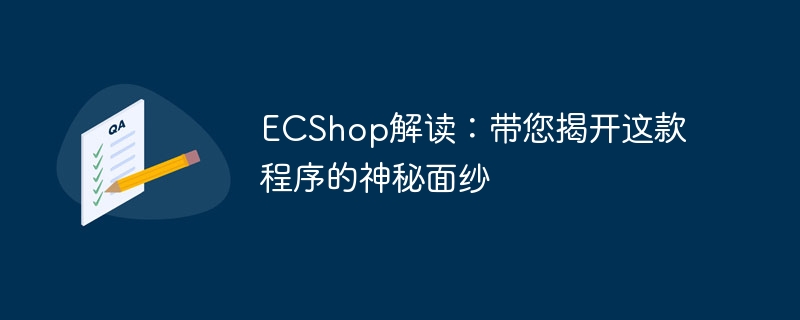

ECShop Interpretation: I will help you uncover the mystery of this program and require specific code examples
ECShop is a powerful open source e-commerce system that is widely used in Various domestic and foreign e-commerce websites. As a mature and stable e-commerce system, ECShop not only provides rich mall functions, but also has flexible customization, meeting the needs of many e-commerce companies. In this article, we will explain ECShop in depth and use specific code examples to help you uncover the mystery of this program.
ECShop is an open source e-commerce system developed by Mr. Zou Xin of the Open Source China Community, and its code is hosted on GitHub. ECShop has the advantages of simple installation, friendly interface, and rich functions, and is deeply loved by developers and enterprise users. ECShop is developed using PHP language and is based on MySQL database. It supports multi-language, multi-currency and other features, and is suitable for e-commerce websites of all sizes.
To start deciphering ECShop, you first need to install it on your server. You can download the latest version of the installation package from the official website of ECShop or GitHub, decompress it, upload it to the server, visit the installation page in the browser, and follow the prompts to install it. After the installation is completed, you can log in to ECShop's backend management system and start configuring your e-commerce website.
ECShop provides a wealth of theme templates for users to choose from, but sometimes you may need to customize the theme according to your own needs. In ECShop, theme customization is mainly achieved by modifying template files and style sheets. For example, you can change the layout of the homepage by modifying the index.dwt file, and adjust the style of the page by modifying the style.css file. The following is a simple code example that demonstrates how to modify the title of the home page:
<!-- Modify the title of the home page -->
<div class="ECS-HomeLogo">
<h1><a href="{$shop_url}">My e-commerce website</a></h1>
</div>With code examples like this, you can easily customize your e-commerce website theme to show your unique style and brand image.
In addition to theme customization, sometimes you may also need to add some new features to your e-commerce website. In ECShop, you can implement these functions by writing plug-ins or custom modules. The following is a simple code example showing how to write a simple product search plug-in:
// Product search plug-in
function search_goods($keywords) {
$sql = "SELECT * FROM `ecs_goods` WHERE `goods_name` LIKE '%$keywords%'";
$goods = $GLOBALS['db']->getAll($sql);
return $goods;
}
// Use the product search plug-in
$keywords = 'mobile phone';
$results = search_goods($keywords);
foreach ($results as $result) {
echo $result['goods_name'];
//Display product details
}Through code examples like this, you can learn how to add new functions to ECShop to meet user needs and improve the user experience of e-commerce websites.
Through the introduction and code examples of this article, I believe you have a deeper understanding of the e-commerce system ECShop. As a mature and stable e-commerce system, ECShop not only provides rich functions and flexible customization, but also provides users with a wide range of expansion and customization space. I hope that through the interpretation of this article, you can better master the use of ECShop and add new vitality and charm to your e-commerce website.
Finally, I hope that the code examples provided in this article can help you better understand the internal mechanism of ECShop and provide you with some reference and help when using and customizing ECShop. May your e-commerce road become broader and broader and achieve greater success!
The above is the detailed content of ECShop Interpretation: Let you unveil the mystery of this program. For more information, please follow other related articles on the PHP Chinese website!
 What programs can be developed with php
What programs can be developed with php
 How to compare the file contents of two versions in git
How to compare the file contents of two versions in git
 What are the design patterns used by laravel?
What are the design patterns used by laravel?
 What should I do if IE browser prompts a script error?
What should I do if IE browser prompts a script error?
 vue references js files
vue references js files
 What should I do if my computer won't turn on?
What should I do if my computer won't turn on?
 Photo display time
Photo display time
 Server monitoring software
Server monitoring software




